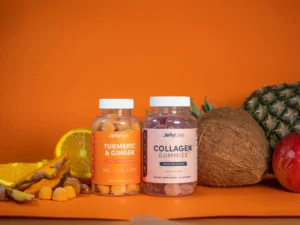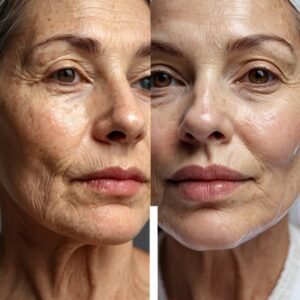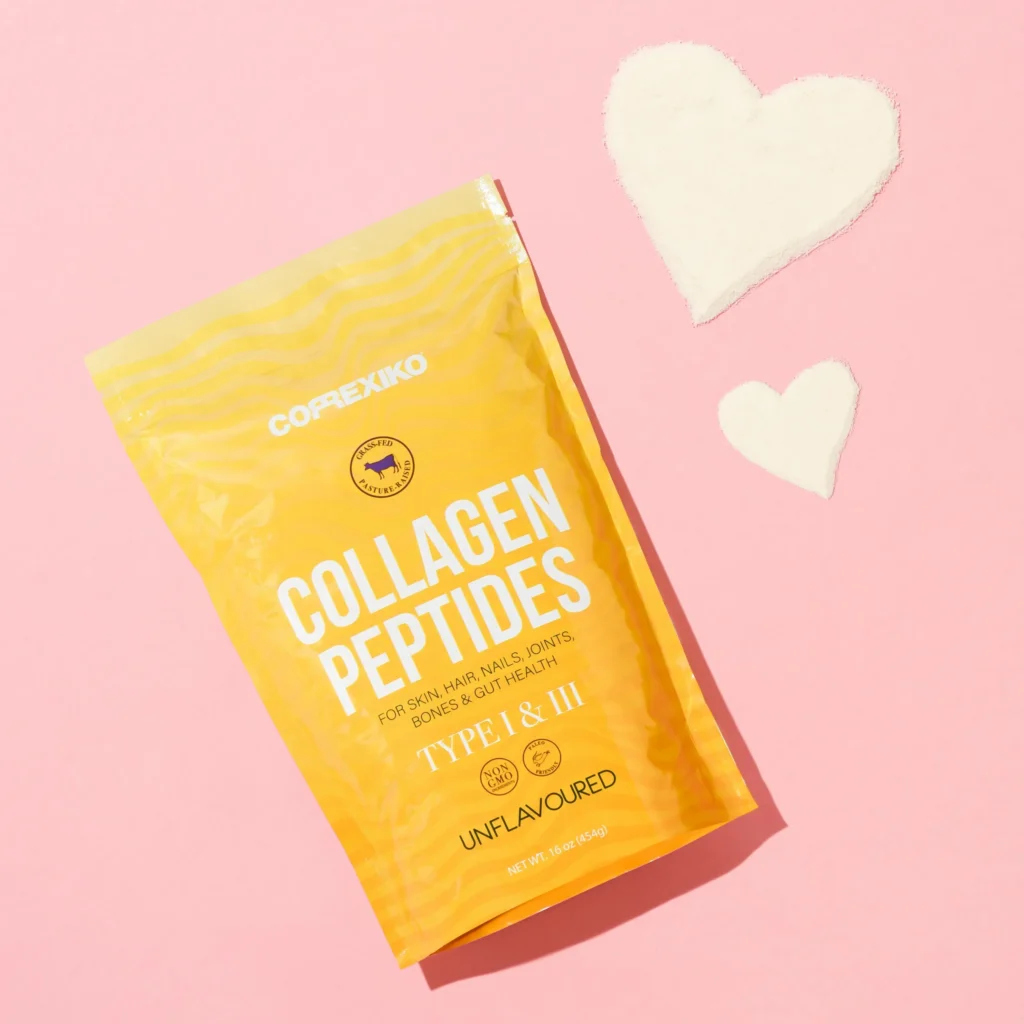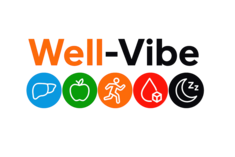Remember when age 40 seemed like an abstract milestone away from you? Well, look who’s approaching it and guess what, it’s not terrible! Other than these subtle little differences, we begin to spot them in the mirror. That’s where collagen comes in. If you’re curious about collagen vs collagen peptides, if these newfangled collagen gummies really are effective, or if that pricey collagen put into face cream is worth it you’re covered with all you need to know about this skin-saver of a protein.
Nourishing from the Inside Out: Let’s not forget that real beauty begins with what you eat. A diet of healthy meals full of colorful vegetables, lean protein, and plenty of water is the key to glowing skin. That said, though supplements such as collagen are potent tools, their best benefit comes from complementing nutrient-rich meals which help deliver to your body a complete range of vitamins and minerals which it demands to function optimally. Consider collagen a complement to your already healthy diet, not a substitute.
The “Wait, What’s Happening to My Skin?” Moment
Let me tell you about a personal moment. I caught myself last year doing that habit of–you know when you’re looking into the mirror, and you’re tugging very lightly at your temple skin, trying to remember how you used to look when you were ten years younger. That’s when I knew I needed to get serious about collagen.
Here’s the truth: our bodies begin to produce about 1% less collagen each year after age 20. By age 40, we’re down approximately 20-25% from our prime. No need to say why those fine wrinkles are no longer fine!
What Exactly IS Collagen, Anyway?
Collagen basically holds our bodies together like glue it is the most common protein in our bodies and constitutes around a third of our protein content. Imagine it like scaffolding under your skin, which prevents all of it from sagging, becoming flat, and getting wrinkled.
During our 40s, that scaffolding becomes a little weaker and collapses to a certain extent. The outcome? Those beautiful presents of aging:
- Wrinkles and fine lines
- Sagging skin
- Joint stiffness
- Brittle nails
- Thinning hair
But first, before you go into an existential meltdown about getting older (been there!), let’s discuss how we can really address it.
Collagen vs Collagen Peptides: What’s the Difference?
Perhaps one of the most puzzling aspects when beginning a collagen journey is distinguishing between collagen and collagen peptides. Allow me to clarify it in simple language:
Collagen: The intact, complete protein that our bodies possess naturally and which is present in some natural food sources. Collagen has a tightly-coiled, intricate structure.
Collagen Peptides: Smaller, broken pieces of collagen which have been hydrolyzed (technical term for “broken down by water”) to be more easily absorbed by our bodies.
Imagine it like when you’re trying to fit an entire cookie into a small mailbox slot, and then when you break it down into crumbs, it fits right through.
Why Collagen Peptides Are So Popular
Here’s why everyone’s fixated on peptides exactly
1. Better Absorption: What you’re paying for is actually absorbed by your body 2. More Convenient to Incorporate into Routine: They are dissolvable and have no taste
3. Quicker Results: Faster results are experienced by most people within 4-8 weeks.
As per a 2019 journal article in The Journal of Drugs in Dermatology women who consumed collagen peptides over 12 weeks experienced a 12% improvement in skin hydration and a marked decrease in wrinkle depth.
The Collagen Gummies Craze: Tasty or Simply an Illusion?

I’ll admit it, I was skeptical about collagen gummies at first. Skincare that tastes like candy? Seems too good to be true. But as someone who has struggled to maintain a consistent supplement routine, I was intrigued by the convenience factor.
The Sweet Truth About Collagen Gummies
I’ll be honest, I was dubious about collagen gummies initially. Skincare that is edible? Too good to be real, right? That said, I’m someone who has had trouble keeping a regular supplement routine going, and so I was drawn to the convenience aspect.
The Sweet Truth about Collagen Gummies
Collagen gummies have become incredibly popular for very valid reasons:
- Pleasant to take: No longer have to choke down huge pills
- Convenient: Simple to recall when it’s essentially a treat
- Travel-friendly: no measuring or mixing
But before you get into the gummy bandwagon, you should know the following
What to Look Out For
A majority of collagen gummies deliver much lower portions of collagen per serving compared to powders or capsules. A good powder can deliver you 10-20g of collagen per serving, while gummies deliver 2-5g.
There’s also the sugar factor. There are brands that add sugars to their gummies, and here’s the irony: they can break down collagen by a process called glycation.
The Bottom Line Regarding Gummies
If you only take collagen consistently in the form of gummies, then they are certainly better than nothing! Look for products containing
- Increased collagen content per serving
- No or minimal added sugars
- Other skin-enhancing vitamins such as vitamins C and E
Face Creams with Collagen: Surface Solution or Deep Fix?

When strolling down any beauty aisle, you’ll notice hundreds of creams touting “collagen” across their packaging. The skin-care nirvana of youthful, full skin in a jar! But can face cream containing collagen really deliver?
The harsh reality: not precisely that, not necessarily in the way you might wish. Why Collagen Creams Have Limitations: Collagen molecules are too big to get through the outer layer of skin. That leaves them to primarily reside upon it, temporarily delivering hydration and not really reforming your skin’s structural collagen.
A 2020 International Journal of Molecular Sciences (http://www.mdpi.com/1422-0067/21/15/5552) review verifies that while topical treatments can enhance surface hydration, they fail to raise significantly your skin’s production of collagen.
When Collagen Creams DO Help:
Collagen creams, though limited, are not entirely useless:
- They are great moisturizers
- They can temporarily plump the skin’s appearance
- Newer products contain peptide technology, which can trigger your skin to produce an increase in collagen
For optimal outcome, choose creams containing active ingredients which trigger natural production of collagen by yourself:
- Retinol
- Vitamin C
- Peptide complexes
- Growth factors
My Personal Collagen Journey: What Really Worked
After three years of trying various collagen methods, these things had the most significant impact on me.
1- Adding Collagen Peptides to My Morning Cup
I started incorporating unflavored collagen peptides into my coffee each morning, and it soon became my non-negotiable daily ritual. No flavor, no mess, just benefits. After about six weeks, my nails had become stronger, and three months later, my friends asked me what I was “doing differently” with my complexion.
2- A Targeted Skin Care
Instead of depending purely on collagen creams, I sought out products that stimulate my skin’s natural collagen production.
- Morning: Vitamin C serum applied before sunscreen
- Evening: Application of Retinol three times
- Weekly: Dead skin cell removal through exfoliation
3- Collagen-Boosting Foods
I boosted my consumption of foods that support the body’s ability to produce and maintain collagen.
- Bone broth (the original collagen supplement!)
- Berries (rich in antioxidants which shield current collagen
- Citrus fruits (vitamin C is critical for collagen formation
- Leafy vegetables (supply the amino acids that are required to produce collagen)
As of publication by Nutrients journal such an inside-out strategy provides the most noticeable outcomes for skin health and complexion.
The Surprising Benefits Beyond Beauty

Although I began taking collagen for looks (no guilt about it!), I’ve been struck by the secondary benefits:
Joint Comfort
Do you remember the time when rising from the ground after playtime for children or pets began getting painful and stiffening your knees? A 2021 study discovered that collagen supplementation resulted in a significant improvement of joint pain among adults, which appeared after 12 weeks.
Improved Recovery After Workouts
When I was in my 30s, I could power through a grueling workout and be just fine the following day. My 40s weren’t quite so forgiving. Collagen has decreased post-workout stiffness and soreness.
Improved Gut Health
It is surprising, but several collagen users indicate enhanced digestion. Collagen’s amino acids restore the lining of the intestines, decreasing inflammation and increasing nutrients’ absorption.
Finding Your Collagen Sweet Spot

Here is the thing about collagen that I wish someone had told me years ago: consistency trumps perfection.
My Realistic Suggestions
1. Begin with a high-quality collagen peptide powder: Choose brands that are sourced from pasture-raised, grass-fed animals and provide test information.
2. Give it a minimum of 8-12 weeks: Get before-and-after photographs since the alterations are often hard to notice when you are viewing your face daily.
3. Combine with vitamin C: Vitamin C, whether from diet or supplements, is needed for collagen production.
4. Protect what you have: Wear sunscreen everyday. No level of supplementation can counteract unprotected sun exposure.
5. Don’t hold out for miracles: Collagen certainly helps, but it doesn’t turn back the clock.
The Bottom Line: Is Collagen Worth It?

As I’m in my 40s and going through this whole aging process with you, I can say assuredly that collagen is worth incorporating into your self-care.
No single cream or supplement can turn back time, but strategic supplementation with collagen provides concrete benefits for skin, joints, and overall energy levels throughout this stage of life.
Remember that getting older is a gift not afforded to many. We don’t want to look like 25 forever, that’s not possible. We can, though, look like our best selves at every life stage. That’s what collagen does.
Your Next Step
When you feel overwhelmed by choice, begin with simplicity.
1. Make a daily habit of taking a high-quality collagen peptide
2. Remain consistent for a minimum of two months
3. Record images to monitor progress
4. Complement your findings with a nutritious diet and proper skin care. Above all else
Remember that self-care is not arrogance, it’s self-respect. You have a right to feel confident and comfortable in your skin, no matter what stage of life you are in.
Have you ever used collagen products? I would love to hear about your experience in the comment section below!
Join our community here for weekly science-backed health tips, free meal plans, and carefully curated product recommendations delivered straight to your inbox!
Disclaimer:
This blog post is for informational purposes only and is not intended as medical advice. Always consult with a qualified healthcare professional before making any changes to your diet, exercise routine, or healthcare plan. The information provided is based on personal research and experience and may not apply to everyone



